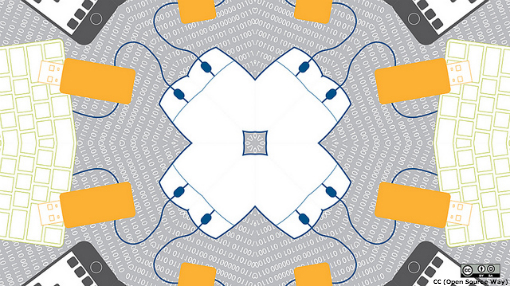Guardians and key masters : the role of Internet intermediaries
by Digital Rights LAC on October 20, 2013
By Veronica Ferrari *
How did Internet intermediaries turn into the guardians of users? The new work by CELE [1] attempts, among other things, to provide a theoretical answer to this question and explores the possibilities of technological solutions in the field.
The activities of our daily lives are, for the most part, mediated by people and institutions that enable and define the ways in which we carry them out. This ranges from the doctor who gives us a prescription, to the airline employee who checks your documents before boarding a plane or the bank cashier who deals with us while making a deposit.
According to the theories that address the issue of intermediaries in general [2], these private actors also act as gatekeepers in both controlling and preventing certain “undesirable” forms of conduct. The intermediaries then appear, in regulatory terms, as an alternative, stemming from the constraints and risks of direct action by the State, which lead to the transfer of regulation and control to the private sector.
The point here is that the guardians are not always interested in the conducts that the state seeks to control. However, due to the resources, the information or the authority that they possess, they are actually in a privileged position to do so. For this reason, the gatekeeping strategy should include legal incentives in order to gain their collaboration. For example, they could assume some form of responsibility, in legal terms, for such “unwanted” conduct by third parties, if they disagree to take on certain obligations.
The theory about guardians (or key masters) has some very unique characteristics on the web. Facebook , Twitter , Google , Dropbox and internet connection providers such as Telefonica and Telmex, in addition to providing a particular service, also control the flow of information. These companies not only make our online activity possible, but just like the rest of the intermediaries we have mentioned, they also help to shape it.
The new work by CELE’s Initiative for Freedom of Expression on the Internet (ILEI), “The housekeeper’s keys : the strategy of Internet intermediaries and the impact on the digital environment“, explores the issue of the liabilities of online intermediaries in relation to content.
The study, prepared by Carlos Cortes Castillo, claims that as digital life expands, both the state and businesses increase their interest in controlling our online activity and preventing such “unwanted” events. In the midst of this scenario of evolution and change, tensions and conflicting agendas, the State has started elaborating ways of making the Internet intermediaries accountable for possible crimes committed by their users. And amid this regulatory agenda and court orders, rights such as freedom of speech or due process seem to be left in parentheses”, says the document.
The work, which seeks to provide theoretical tools for regulatory discussions that take place in Latin America today, firstly explores the general theories mentioned above and their relation to civil liability. It also examines the balance between the costs assumed by intermediaries and their gain for being in the role of guardians. The paper points out that an imbalance between these costs and benefits would imply “a failed strategy that also makes a negative impact on socially desirable activities and affects fundamental rights such as due process and freedom of expression”.
As a direct reference to the digital environment, the paper gives an account of the background of how the Internet intermediaries came to assume their position as the guardians of users. It explores the types of intermediaries that exist along with their duties and responsibilitiy models: from absolute immunity, through conditioned immunity to subjective responsibility .
Towards the end, the document warns of the risk of considering content filtering as an alternative to the issue of liability of intermediaries and raises the idea of exploring and contemplating technological solutions to balance the debate on Internet [3]
[1] Centro de Estudios en Libertad de Expresión y Acceso a la Información
[2] For example “Gatekeepers: The Anatomy of a Third-Party Enforcement Strategy” by Reinier H. Kraakman and “A framework for identifying Internet information gatekeepers” by Emily Laidlaw.
[3] According with Eduardo Bertoni, CELE´s director, in Global Voices: http://es.globalvoicesonline.org/2013/05/30/una-solucion-tecnologica-para-el-problema-de-la-responsabilidad-de-intermediarios/
* Degree in Communication Sciences ( UBA ), currently working on CELE Center Studies on Freedom of Expression and Access to Internet-related Information projects, also deals with communication issues at the center. E- mail: cele@palermo.edu / twitter : @ CELEUP






